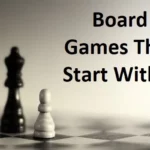These days, all children don’t learn best through pencil-and-paper instructions. In fact, a non-profit organization shows that game-based learning platforms are already on the rise. They help in creating an engaging dynamic that inspires students and children in honing their skills.
If your child gets bored too easily, here are the 15 types of educational games that you may give him.
Types Of Educational Games For Kids

BOARDGAME
As long as educational games are concerned, they come in various styles, formats, and tailor to the needs of a wide array of users. Given the plethora of options that we have in the market, there is one type of board game that seems ideal for adults and children.
It is rather too easy to find out an educational board game that is created to meet the needs of any kind of child. These are certainly some of the best ways of having fun while learning.
There are too many educational board games that match the theme of the study unit. Hence, this improves learning and makes the process enjoyable.
MEMORY GAME
Do you think your child needs to improve his short-term memory skills? Does he keep forgetting things very easily? If yes, memory games are one of the most effective ways of working on building memory. These are immensely popular among children.
These games comprise tiles or a deck of cards that generally come in pairs. Players have to place them on the table, face down, and then work to find out the matching pairs. When they flip over the tiles, they have to remember which tile was in which place so that they may utilize that during their own turn.
MATCHING GAME
For the younger players who get bored at home and have an urge to learn, matching games are popular among them. In this game, the players have to notice a specific feature of items and then look forward to finding a match.
This game is a perfect way for the players to speak about how few things are similar to each other or different. Players can also learn about their shape, size, sound, color, and more.
The player won’t require a lot of strategy or skill while playing this game but they have to focus on what is out on the board to heighten chances of winning.
CARD GAME
If compared to board games, the educational card games are much faster-paced. The card games are compact and small and hence they are perfect to be carried on the road. You can take it out anywhere and play even on the go.
Such educational card games are created to meet the interests of an array of players. Hence, these games are best in filling the educational gaps among generations.
They usually come in different styles and are extremely easy to learn and play.
DICE GAME
Dice games are usually fast-paced and highly portable. This makes dice games perfect to be carried while traveling and you can also test your math skills while playing them. Usually, dice games cater to improving your mental speed and math awareness.
The dice games are too interesting and appealing in that these are not just easy-to-learn but also pretty educational. This implies that the players who play these games don’t realize that they’re learning.
These dice games reinforce math facts and make sure a student relates properly with numbers and know how to succeed.
VIDEO GAME
There are some children who love playing video games instead of playing other card or board games. Fortunately, there are educational video games in the market that the parents may select from for their children.
Video games usually vary in the type of content they cover and the characters which are there in the game. However, there are things that make most educational video games similar to each other.
These games are fast-paced and hence the players can retain the attention of the person who is playing. They can focus on a theme through which educational gaps can be bridged.
STRATEGY GAMES
Strategy games need players to think ahead of not just the moves they wish to make but also the moves which the opponent players will make in the near future. One of the popular and common types of strategy games is chess.
In chess, the players put against each other in an effort to move the pieces through the board and take the opponent player’s ‘KING’.
Chess is said to be a great strategy game and players will learn not just the game’s rules but also understand how to plan for future moves. Chess teaches you patience.
COMPUTER GAMES
Computer games will always be famous among children but now educators and parents are utilizing the fun of computer games without being concerned about what the children are learning from the games.
Computer games are fast-paced and this is perfect for children with short attention spans. While they would struggle to focus on conventional games, this game is ideal for them.
Educational computer games are there in several formats and they cover a plethora of subjects. They make sure children fully understand the subject matter in which they’re playing.
COOPERATIVE GAMES
These games are different from the others mentioned in this list. Instead of placing players against each other, cooperative games take away the stress of competition. In most games, there is the stress of competing with your opponents but this is not the case with cooperative games.
In these games, players work together to win and this is useful for players who keep struggling to speak to each other. Children will want to control things in a group.
While the educational opportunities aren’t similar to the other options, the best thing about these games is learning how to work together.
SPATIAL REASONING
Spatial reasoning is a vital skill that is often neglected in schools. What is the best way of improving your child’s spatial reasoning skills? Well, you can invest in fun games that are not just fun but also challenging at the same time.
Spatial reasoning games require critical thinking and though they look similar to strategy games, they usually make players think deeply.
Few games that can be considered as educational games are puzzle games where players arrange pieces in order to form something. Movement games are also a part of spatial reasoning.
CODING GAME
Coding is gradually gaining momentum not just among children but among students who wish to pursue higher studies with computers.
It can be boring to learn coding on a computer but when you use a game to learn to code, this is a great way to enjoy the process. There will be no boredom that is usually associated with conventional old-school learning methods.
These days, coding games also include robots which can be used by children to learn controlling via coding. This makes them more likely to put effort and time into their education.
MONEY GAMES
Older children should learn how to handle their finances and when you learn this skill through games, the learning process gets easier. The games usually introduce money in a relaxed and fun way and make sure players not just know the role of money but also how to count it.
Rather than letting this whole process become stressful, the games are more approachable. These are perfect games for parents who have to introduce money matters to their children. Children can learn how to tackle money and count on it in a stress-free way manner.
PUZZLE GAMES
Puzzles are one of the best ways of learning and thankfully, they come in different topics, styles, and designs. Hence, it gets easier to find one which will cater to the requirements of your child. These puzzles are not just intuitive but they also make learning easy and fun.
Puzzles can be conventional where several pieces can be gathered together to form a bigger picture like a map.
You also get education puzzles which are ideal for younger children where the child arranges 2 or 3 or 4 pieces to match numbers or spell a word or design rhymes.
COUNTING GAMES
Number games and counting games usually overlap in few ways but they’re totally different. This is a proper counting game where players learn how to count. This is vital for any other math which they’re going to complete while growing up.
Instead of memorization via rote repetition, counting games can be interactive and fun. This keeps children interested throughout the game and doesn’t let them get bored.
These games feature bright colors and funny characters and hence children feel highly intrigued while playing these games. They also have fun while educating themselves.
WORD GAMES
For some children, it can be a tricky experience to learn and recognize letters and match them with their sounds. In such a situation, if you choose a word game, things will get easier and learning will become fun.
These games require players to learn letters and successfully form words. Your kids will find letters to fit into their needs and match pictures to words. As they’re fun, players won’t realize that they’re learning things.
These games provide the best chance for reinforcing the learning which a child does in school. Parents rely on such games to help their children become strong readers.








